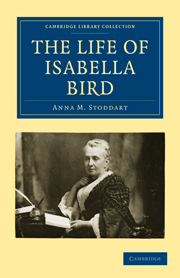Book contents
- Frontmatter
- PREFACE
- Contents
- LIST OF ILLUSTRATIONS
- CHAP. I PARENTAGE AND INHERITANCE
- CHAP. II FIRST TRAVELS AND PUBLICATIONS
- CHAP. III EDINBURGH AND WORK
- CHAP. IV IN JOURNEYINGS OFT
- CHAP. V THE WIDE EAST
- CHAP. VI “AN TAON BHEANNICHT” (“THE BLESSED ONE”)
- CHAP. VII MARRIAGE
- CHAP. VIII LOSS
- CHAP. IX “THROUGH MANY LANDS”
- CHAP. X NATIONS THAT SIT IN DARKNESS
- CHAP. XI PUBLIC WORK
- CHAP. XII THE FAR EAST
- CHAP. XIII THE CHANGING EAST
- CHAP. XIV LAST JOURNEYS
- CHAP. XV “I AM GOING HOME”
- APPENDIX
- INDEX
- PART OF NORTH AMERICA
- Plate section
CHAP. III - EDINBURGH AND WORK
Published online by Cambridge University Press: 05 August 2011
- Frontmatter
- PREFACE
- Contents
- LIST OF ILLUSTRATIONS
- CHAP. I PARENTAGE AND INHERITANCE
- CHAP. II FIRST TRAVELS AND PUBLICATIONS
- CHAP. III EDINBURGH AND WORK
- CHAP. IV IN JOURNEYINGS OFT
- CHAP. V THE WIDE EAST
- CHAP. VI “AN TAON BHEANNICHT” (“THE BLESSED ONE”)
- CHAP. VII MARRIAGE
- CHAP. VIII LOSS
- CHAP. IX “THROUGH MANY LANDS”
- CHAP. X NATIONS THAT SIT IN DARKNESS
- CHAP. XI PUBLIC WORK
- CHAP. XII THE FAR EAST
- CHAP. XIII THE CHANGING EAST
- CHAP. XIV LAST JOURNEYS
- CHAP. XV “I AM GOING HOME”
- APPENDIX
- INDEX
- PART OF NORTH AMERICA
- Plate section
Summary
Wyton was left behind, and for some time Mrs. Bird and her daughters were without a settled home. When the demand for a book on “Religion in America” reached Miss Bird, she was visiting relatives near Tunbridge Wells. She proposed to revise her papers, and to make such alterations as would suit them for readers not exclusively of the religious world, but for those who were less likely to be acquainted with their subject.
The book was published by Messrs. Sampson Low & Co., in the summer of 1859, and gave a remarkable summary both of the sectional characteristics of American creeds and churches, and of their practical influence on the various divisions of the nation. Thus, she pointed out that in the north, Congregationalism and Puritan forms of worship resulted from the stern virtue of the Puritan Fathers; that in the south, Episcopalianism was established by the immigrant merchants and gentlemen; and that in the West, where were collected the restless and enterprising elements of European and American society, “every creed had its adherents and every church its ministers, from Mormonism upwards.” It abounds in graphic description and illustration, and ends with the declaration of her steady faith in the growth of Christianity throughout America and the great country's destiny in carrying out God's purposes towards the human race.
Just before Aspects of Religion in America was published, Miss Bird spent three weeks in Ireland investigating what was known as the “Ulster Revival,” a movement which had spread from America, and which showed some of the undesirable features of an excitement communicated rather than inspired.
- Type
- Chapter
- Information
- The Life of Isabella Bird , pp. 47 - 69Publisher: Cambridge University PressPrint publication year: 2011First published in: 1906



